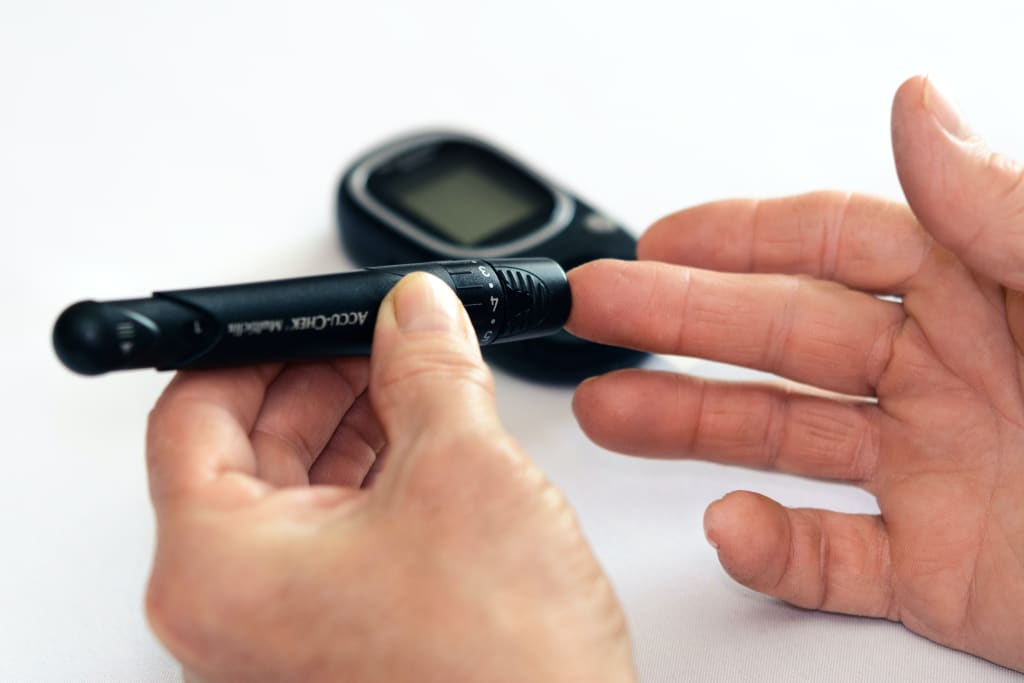10 common triggers for high blood sugar levels
high blood sugar control

Glucose, or blood sugar, is a kind of sugar derived from the meals we eat and used by the body for energy. Glucose is transported throughout the body via the circulatory system and utilized by cells for immediate energy needs or stored as glycogen in the liver and skeletal muscles for later use. The body requires insulin, which is secreted by the beta cells of the pancreas in response to rising blood sugar levels. Normal bodily function depends on keeping blood glucose levels stable, and chronically high blood sugar levels can have devastating effects on one's health. People with diabetes need to take medication and/or make changes to their lifestyle in order to keep their blood sugar levels within a healthy range
Here are 10 triggers for high blood sugar levels
1. Consuming sugary beverages and foods
High blood sugar levels can be caused by sugary drinks and foods because they are high in carbohydrates, which the body quickly turns into glucose. Glucose is the body's main source of energy, but people with diabetes have trouble controlling how much sugar is in their blood. When they eat or drink something with a lot of sugar, their blood sugar levels can rise and stay high for a long time. This is called hyperglycemia. Over time, this can lead to major health problems like damage to the kidneys, eyes, and other organs. People with diabetes are told to avoid foods like sugary drinks and snacks that make their blood sugar levels rise and to check their blood sugar levels often to help keep them in a healthy range.
2. Lack of physical activity
Lack of exercise can cause high blood sugar because it helps the body use insulin better, which can drop blood sugar levels. Inactivity makes the body less sensitive to insulin, which can lead to insulin resistance and higher blood sugar levels. People with diabetes can control their blood sugar levels and lower their risk of problems by working out regularly. At least 30 minutes of moderate-intensity exercise at least 5 days a week, like walking, dancing, riding a bike, or swimming, can help control blood sugar levels and lower the risk of heart disease and nerve damage. People with diabetes should also know the signs of low blood sugar when they exercise, such as feeling dizzy, confused, weak, and sweating a lot, and take steps to avoid hypoglycemia.
how much physical activity is recommended to manage blood sugar levels
Experts say that people with diabetes1 should spend at least 150 minutes a week doing fairly intense physical activities like fast walking, swimming laps, riding a bike, or playing sports. Regular exercise can help people with diabetes control their blood pressure and blood sugar, get in better shape, keep their weight in check, and feel better about themselves.
Before, during, and after physical exercise, it is important to keep track of blood sugar levels to avoid dangerous blood sugar changes1. People with diabetes should also stop exercising if their blood sugar level is 70 mg/dL or lower and eat or drink something to raise their blood sugar level1. It is best to work out between one and three hours after eating when your blood sugar is likely to be higher4. If your blood sugar level is below 100 mg/dL before you exercise, eating a piece of fruit or a small snack can help avoid hypoglycemia.
3. Insufficient insulin or oral medication dosage
People with diabetes can get high blood sugar if they don't get enough insulin or if they take too little of their daily medications. Most of the time, diabetes is caused by not having enough insulin or not being able to use insulin well. People with diabetes must take medicine, like oral diabetes medicines or synthetic insulin, or make changes to their lifestyle to help keep their blood sugar levels in the normal range. If insulin is given too little, too much, or at the wrong time, it can cause both temporary and dangerous low or high blood sugar, wide swings in blood sugar, severe low blood sugar, and diabetic ketoacidosis. High blood sugar can be caused by not giving enough basal insulin, not giving enough insulin to cover the carbs, or not counting the carbs correctly. To keep blood sugar levels from getting too high or too low, it's important to check them often and change medication doses based on each person's needs.
what are some common causes of insufficient insulin or oral medication dosage?
Several things can lead to not getting enough insulin or oral medicine. Low blood sugar is often caused by too much insulin, either because the body makes too much on its own or because someone injects too much artificial insulin.
Low blood sugar can also be caused by problems with hormones and the way the body works. People with diabetes often get hypoglycemia when they take too much insulin, the wrong insulin, or inject it into the muscle instead of the fat tissue, don't time their insulin and carb intake right, take too much or too high of a dose of oral diabetes medications, are more active than usual, drink alcohol before eating, eat later than usual or don't eat at all, or don't eat balanced meals with fat, protein, and fiber.

4. Stress
People with diabetes can get high blood sugar when they are stressed. When the body is stressed, hormones like cortisol and adrenaline are released. These hormones can cause the blood sugar level to rise. This could make people with diabetes feel bad, but it is possible to deal with. Most of the time, mental stress like thinking about work or family raises blood sugar. Physical worry, like being sick or hurt, can also cause a person's blood sugar to rise. Hormones released by worry can raise blood sugar, heart rate, and blood pressure. High blood sugar can make a person feel worse and make diabetes harder to control. People with diabetes who are often stressed are more likely to have trouble keeping their blood sugar under control.
how can people with diabetes manage stress to avoid high blood sugar levels
People with diabetes can keep their blood sugar levels from getting too high by finding healthy ways to deal with stress. Exercise, meditation, deep breathing, and yoga are all ways to deal with worry that can help lower stress levels. It's also important to live a healthy life by eating healthy foods, keeping an eye on your blood sugar levels, and taking your medications as directed. People with diabetes can handle hard or stressful scenarios better if they have a plan. Healthcare workers can also help people deal with stress by making the situation seem normal and checking for depression and diabetes-related stress. People with diabetes should also keep track of their amounts of stress and blood sugar to see how stress affects how they take care of their diabetes.
5. Poor sleep patterns
People with diabetes can get high blood sugar when they don't sleep well. If you don't get enough sleep, your insulin resistance can go up, which can make your blood sugar levels go up. Sleep problems and illnesses, like sleep apnea, can also make it more likely that a person has diabetes. Diabetes may also be more likely to happen to people who sleep more than 9 hours a night. If you don't get enough sleep, it can change how your body makes other hormones, which in turn affects how your blood sugar works. Cortisol is a hormone that is made by the body when it is stressed. It makes the body less sensitive to insulin, which can cause blood sugar levels to rise. So, people with diabetes need to develop good sleep habits to help them control their blood sugar levels.
how much sleep is recommended for people with diabetes
People with diabetes should try to sleep at least 7 hours a night to help keep their blood sugar levels under control. The American Academy of Sleep Medicine and the Sleep Research Society both say that people should get at least 7 hours of sleep each night. Teenagers and kids need more sleep than adults do. Diabetes can be harder to control and insulin resistance can go up if you regularly sleep less than 7 hours per night. But people who sleep more than 9 hours a night might also be more likely to get diabetes.
6. Illness or infection
People with diabetes can get high blood sugar when they get sick or have an infection. More glucose is put into the bloodstream as part of the body's defense system against sickness and infection. Infections or illnesses like the flu or a cold can cause high blood sugar, loss of control over diabetes, and diabetic ketoacidosis (DKA) in people with type 1 diabetes. DKA happens when the body needs to break down fat for energy, which can cause a diabetic coma. When a person's immune system is weakened by high blood sugar, they are more likely to get sick. People with diabetes need to keep a close eye on their blood sugar levels when they are sick or have an infection. If their blood sugar levels are high, they should see a doctor. Here are some common infections that can cause high blood sugar in people with diabetes,
Urinary tract infections (UTIs): UTIs can cause stress and inflammation in the body, which can raise blood sugar levels.
Respiratory infections: When the body fights off an illness, like pneumonia or bronchitis, it can cause the blood sugar to rise.
Infections of the skin: Infections of the skin caused by bacteria or fungi, like cellulitis or athlete's foot, can cause an immune reaction and make insulin resistance worse.
Infections in the mouth, like gum disease or tooth sores, can cause blood sugar levels to rise.
Kidney infections (pyelonephritis): Kidney infections can cause stress and inflammation, which can make it hard to control your blood sugar.
Gastrointestinal infections: Infections like diarrhea or food poisoning can temporarily make insulin less effective, which can lead to high blood sugar.
Infections of the reproductive organs: In women, yeast infections or bacterial vaginosis can change how much sugar is in their blood
7. Medications
High blood sugar in people with diabetes can be caused by taking some medications meant for treating disorders other than diabetes, such as those for high blood pressure, chronic obstructive pulmonary disease, or depression. Blood sugar levels can be affected by a variety of nonprescription drugs and substances, including alcohol, coffee, and nicotine. Antibiotics, antipsychotics, beta-blockers, and corticosteroids are just a few examples of drugs that might increase blood sugar and make it more difficult to maintain a healthy level. Many common drugs, including statins, beta-blockers, corticosteroids, antipsychotics, antibiotics, and decongestants, can cause an increase in blood sugar. Therefore, it is crucial for diabetics to discuss their medication regimen with their physician and how it may influence their blood sugar levels. Here is how you can monitor your blood sugar while taking medications.
The use of a blood glucose meter for at-home monitoring of blood sugar levels is known as self-monitoring of blood glucose (SMBG). Blood sugar levels can be monitored by measuring them at various times of the day as recommended by a doctor.
Glucose levels can be monitored continuously with a small sensor implanted beneath the skin, as in a continuous glucose monitoring (CGM) device. Particularly helpful for people taking drugs that can induce blood sugar swings, it delivers data in real time.
Regular visits to your doctor allow healthcare providers to monitor your blood sugar levels over time with tests like the A1C. During these checkups, the doctor might also adjust the patient's dosage to account for any changes in their condition.
Keeping track of blood sugar readings, medication doses, and any noticed patterns or symptoms can help healthcare providers spot trends and make more educated decisions about medication management.

8. Hormonal changes
High blood sugar levels in diabetics have been linked to hormonal changes. Changes in hormone levels, particularly estrogen, have been linked to both increases and decreases in blood sugar. Postmenopausal women with diabetes are at increased risk for severe swings in blood sugar due to the effects of menopausal hormone changes. Hyperglycemia (high blood sugar) and hypoglycemia (low blood sugar) can be brought on by hormones. Some forms of hormonal imbalance can cause insulin resistance, which in turn can cause weight gain and other issues with diabetes control. In light of the fact that hormonal changes can impact blood sugar levels, it is crucial for persons with diabetes to engage with their healthcare practitioner to effectively manage their condition. Here is how hormonal changes can trigger high blood sugar levels.
Increased insulin resistance is associated with hormonal changes like those seen during menstruation and menopause. Blood sugar levels are controlled by the hormone insulin, which facilitates glucose entry into cells for use as fuel. High blood sugar levels are the result of cell resistance to insulin.
The release of the hormone glucagon, which causes the body to produce more glucose, can be affected by hormonal abnormalities. Glucagon stimulates the release of glucose into the bloodstream by stimulating the breakdown of glycogen stored in the liver.
Stress causes the body to release cortisol, also called the stress hormone. High cortisol levels can cause hyperglycemia by increasing glucose synthesis in the liver and decreasing insulin sensitivity.
Fluctuations in growth hormone: growth hormone helps control blood sugar. Blood sugar levels can rise when growth hormone output is uneven, as it is throughout puberty or in response to certain medical problems.
Hypothyroidism (an underactive thyroid) and hyperthyroidism (an overactive thyroid) are two examples of thyroid hormone disorders that can have an effect on glucose regulation. Hyperthyroidism can enhance insulin resistance and boost glucose synthesis, while hypothyroidism can decrease sensitivity to insulin.
9. Dehydration
Diabetics are particularly susceptible to having their blood sugar levels spike due to dehydration. High blood glucose levels cause the body to become dehydrated, while a lack of fluids can cause blood sugar to become overly concentrated. Dry mouth and excessive thirst are early warning signs of diabetes because they indicate mild dehydration. Too much glucose in the bloodstream prompts the kidneys to generate more urine, which can lead to dehydration. Therefore, it is crucial for persons with diabetes to drink plenty of water and other fluids to prevent dehydration and maintain a healthy fluid balance. There are a number of mechanisms through which dehydration causes hyperglycemia.
Insulin's efficacy decreases because of increased blood glucose levels that might occur when the body is dehydrated. This can make it harder for insulin to get glucose into cells from the blood, which can raise blood sugar levels.
Dehydration causes an increase in the production of the hormone glucagon, which has the effect of increasing blood sugar levels. Glucagon stimulates the release of glucose into the bloodstream by stimulating the breakdown of glycogen stored in the liver.
Dehydration impairs kidney function because the kidneys, which remove toxins and excess glucose from the blood, are under stress. Dehydration can impair kidney function, decreasing glucose excretion and thus increasing blood sugar levels.
Dehydration lowers blood volume, which in turn affects how much oxygen and nutrients reach cells throughout the body. This can cause hyperglycemia by disrupting the body's regular blood sugar balance.
Dehydration causes the body to go into stress mode, releasing cortisol and other stress chemicals. By stimulating glucose synthesis in the liver and decreasing insulin sensitivity, these hormones can raise blood sugar levels.
10. Overeating or excessive carbohydrate intake
People with diabetes are more susceptible to hyperglycemia when they overeat or consume an abnormally large amount of carbohydrates. Type 2 diabetes is just one of several diseases that can be exacerbated by eating an excessive amount of carbohydrates, especially those with a high glycemic load. Too much food consumed in one sitting can lead to an increase in blood sugar. Weight gain, poor metabolic health, and an increased risk of heart disease are all consequences of consuming an excessive amount of carbohydrates, which places a heavy metabolic burden on the body. Therefore, persons with diabetes need to keep an eye on their carbohydrate intake and collaborate with their doctor to create a personalized healthy eating plan. There are many low-carbohydrate choices to high-carbohydrate foods that can be added to a healthy diet. Here are some examples:
Cauliflower rice: Instead of regular rice, you can make cauliflower rice by chopping or cutting the cauliflower into small pieces. It has fewer carbs and can be used as a base for stir-fries, fried rice, and salads without grains.
Lettuce wraps: Instead of tortillas or bread, you can wrap grilled chicken, turkey, or veggies in large lettuce leaves. Wraps and sandwiches can be replaced with lettuce wraps, which are delicious and low in carbs.
Zucchini noodles: Instead of regular noodles, you can use zucchini noodles, also called "zoodles." Spaghetti, stir-fries, and salads can all use spiralized or thinly sliced zucchini in place of pasta.
Portobello mushroom caps: You can use big Portobello mushroom caps instead of burger buns or bread slices. Portobello mushrooms that have been grilled or roasted can be used as a tasty, low-carb filler for burgers or sandwiches.
You can use coconut or almond flour instead of wheat flour in making recipes. They have fewer carbs and more fiber and healthy fats than other foods. You can use them in bread, muffin, pancake, and other baking recipes.
Greek yogurt: Instead of sweetened yogurts, which are often high in added sugars, choose plain Greek yogurt. Greek yogurt has less sugar and more nutrients than regular yogurt. It can be eaten on its own or used in place of sour cream or as a base for soups and dressings that need to be creamy.
Nut butter: Instead of spreads that are high in added sugars or carbohydrates use natural nut butter like almond or peanut butter. Nut butter is a good source of healthy fats and protein and can be eaten on its own, spread on low-carb crackers, or added to soups.
Conclusion
High blood sugar, also called hyperglycemia, can be caused by a number of things, such as worry, illness, being dehydrated, eating too much, and eating too many carbs. When blood sugar levels stay high for a long time, it can cause major problems, like diabetic ketoacidosis and a higher chance of getting heart disease. People with diabetes need to keep an eye on their blood sugar levels and work with their healthcare providers to come up with a healthy eating plan that fits their needs and tastes. This could mean swapping out high-carbohydrate foods for low-carbohydrate ones, staying hydrated, and getting frequent exercise. People with diabetes can lower their chance of complications and improve their overall health and well-being by taking good care of their blood sugar levels.
About the Creator
Abby blasius
I am a passionate content creator with a strong focus on health and wellness. While my educational background lies in a Bachelor of Accounting and Finance, it is my innate desire to help people feel good about themselves in mind, body&soul






Comments
There are no comments for this story
Be the first to respond and start the conversation.